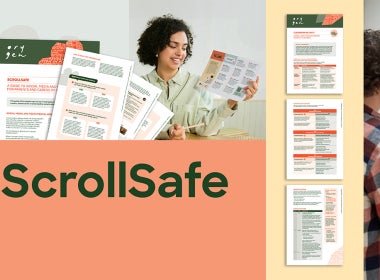
How to become a mental health nurse
Nearly half of all Australians will suffer from mental illness at some point in their lives, highlighting the critical role mental health nurses play in providing care and support to those in need.
With an increasing spotlight on mental health awareness and a need for holistic approaches to care, entering this specialised field is an impactful and rewarding career choice.
If you’ve been considering a future in mental health nursing, this guide will walk you through what the role entails, the steps required to become a mental health nurse and the exciting career opportunities available in this field.
What is a mental health nurse?
A mental health nurse is a registered nurse with specialised skills in supporting individuals facing mental health challenges.
Unlike general nurses, mental health nurses focus on the psychological and emotional wellbeing of patients. They tailor care to their patients’ unique circumstances and collaborate with multidisciplinary teams to deliver holistic outcomes.
What does a mental health nurse do?
So, what does a mental health nurse do? The role of a mental health nurse is varied and, depending on the setting and position, may include the following responsibilities:
- Promoting and educating about mental health
- Assessing patients’ mental health
- Delivering treatment, including counselling and other strategies
- Managing patients’ records
- Collaborating with other healthcare professionals to coordinate patient care
- Supporting patients and their families
- Working with patients to plan recovery
- Medication administration.
Regarded as a rewarding vocation, the role offers versatility in terms of the settings and the roles on offer, along with the skills and qualifications that nurses come to possess—now and in the future.
Where do mental health nurses work?
As a mental health nurse, you might work in a range of different healthcare settings.
- Hospital or clinical settings:
- Emergency care or a mental health unit within a hospital
- Specialised psychiatric care hospitals
- Community-based roles:
- Outreach programs
- Rural mental health initiatives
- Specialised facilities:
- Aged care homes
- Private therapy and counselling centres
Beyond clinical roles, mental health nurses can also transition into education or research, further contributing to advancements in mental health care.
Steps to become a mental health nurse in Australia
To become a mental health nurse in Australia, you must follow a series of clear steps that provide the necessary knowledge and skills for this vital field. This guide outlines the essential stages involved.
Step 1: Obtain a bachelor’s degree in nursing
The first step on your path is to complete a recognised bachelor’s degree in nursing. This qualification provides foundational knowledge in health sciences, patient care and clinical nursing skills.
Upon completion, you must register with the Australian Health Practitioner Regulation Agency (AHPRA) to begin practising as a registered nurse.
Step 2: Gain clinical experience
Hands-on clinical experience is essential for developing practical skills and understanding the realities of nursing. Working in mental health units or settings while accumulating general nursing experience is often seen as the best way to immerse yourself in this field.
Step 3: Enrolling in a Graduate Mental Health Nursing program
For some, specialising in mental health begins with a graduate program in mental health nursing. These structured programs provide intensive practical experience and professional development opportunities that ease your pathway into this niche field.
Here are some standout programs to consider:
- Mercy Health’s Mental Health Graduate Nurse Program: A two-year program with rotations in acute and community mental health settings, offering clinical supervision, tailored clinical education and pathways toward postgraduate studies.
- Alfred Health’s Graduate Nurse Program (Mental and Addiction Health): Provides opportunities across inpatient and community settings with access to accredited study, clinical supervision and a professional development fund.
- Western Health’s Mental Health Graduate Nurse Program: A program designed to align with your career goals, offering two clinical rotations, dedicated preceptors and structured professional learning in a supportive environment.
- Orygen's Graduate Mental Health Nurse Program: Specialising in youth mental health, this two-year program offers placements in inpatient and community settings, alongside structured academic learning and professional supervision.
These graduate programs not only enhance your clinical skills but also often include Recognition of Prior Learning (RPL) agreements and pathways for credit and advanced standing in postgraduate qualifications such as a graduate diploma or a master’s course in mental health nursing.
Students in these recognised nursing programs can apply for advanced standing of three to four units in VU Online’s Graduate Diploma in Mental Health Nursing or Master of Mental Health Nursing, providing a valuable opportunity to expedite their educational journey.
By combining the comprehensive clinical training of a graduate program with the flexibility and expertise of postgraduate study, you'll be well on your way to becoming a skilled and confident mental health nurse.
Step 4: Specialise in mental health nursing
To take the next step, complete a postgraduate qualification in mental health nursing, such as VU Online’s Master of Mental Health Nursing.
In this degree, you’ll acquire evidence-based skills allowing you to excel in the role of a mental health nurse and provide better health outcomes for the public. With 12 units, including one elective, you’ll study subjects such as:
- Effective Trauma-Informed Care
- Recovery-Oriented Mental Health
- Evidence and Research for Practice
- Mental Health in Later Life
- Pharmacology and Therapeutics in Mental Health
The Master of Mental Health Nursing also builds on your prior experience and study. You will:
- Learn about comprehensive mental health practice
- Develop an ability to work within multidisciplinary teams
- Gain a holistic understanding of mental health and how it impacts individuals, their families and the wider community
- Design and undertake mental health research
- Develop the skills to critically review healthcare evidence
The course is grounded in contemporary, trauma-informed care that will enable you to create better mental health outcomes for your patients.
In the context of modern Australian society, you will also develop an understanding of mental health nursing practice in diverse communities. This includes refugee communities, LGBTQIA+, as well as Aboriginal and Torres Strait Islander people.
VU Online’s flexible Block Model allows you to study one unit every seven weeks, making postgraduate learning feasible for working nurses.
As an experienced registered nurse, studying online offers many benefits. The flexibility of where and when you learn, a more manageable schedule, and a modern, relevant education that can be applied in real-time to your career are just a few.
You can achieve your master’s degree part-time in just two years, empowering you to advance your career without stepping away from work.
Skills you need for mental health nursing
To excel in mental health nursing, you’ll need more than medical knowledge. This career demands compassion, resilience and a genuine desire to advocate for those struggling with mental health. Essential skills include:
- Empathy and compassion: Understanding the emotional and psychological challenges of patients
- Communication: Building trust with patients and clearly exchanging information with families and care teams
- Problem-solving: Creating tailored treatment plans that suit varied patient needs
- Adaptability: Managing fast-paced environments and addressing diverse cultural and individual requirements
Want to assess if this profession is right for you? Reflect on your ability to stay calm in crises and your interest in improving mental health outcomes on both individual and systemic levels.
Career pathways in mental health nursing
Mental health nursing offers several career trajectories, depending on your interests and expertise. As the need for mental health professionals increases, significant job security and progression opportunities exist. For example:
- Clinical roles
- Nurse practitioners specialising in mental health.
- Psychiatric nurses in emergency departments.
- Leadership opportunities
- Team leaders or care coordinators in mental health services.
- Community-based initiatives
- Nurses working in rural or remote programs to close healthcare gaps.
- Research and education
- Academic roles shaping the next generation of nurses or contributing to evidence-based care advancements.
The median annual salary for a mental health nurse in Australia is approximately $100,000 to $110,000, with experienced professionals earning over $130,000.
With federal government funding increasing in response to the nationwide mental health workforce shortage (AIHW), this is an ideal time to specialise and carve out a rewarding career.
Frequently asked questions
How long does it take to become a mental health nurse in Australia?
Becoming a mental health nurse typically takes:
- three years for a Bachelor of Nursing
- at least one to two years of clinical experience
- one to two years of postgraduate study depending on your study pathway
Why become a mental health nurse?
Becoming a mental health nurse allows you to:
- play a key role in improving access to care and reducing stigma around mental health.
- provide critical support to patients dealing with anxiety, depression or other mental health challenges.
- contribute to addressing Australia’s shortage of mental health professionals, especially in rural areas.
- benefit from job security and federal funding aimed at growing and supporting the mental health workforce.
- be part of a career where your work directly impacts individuals and communities.
Step into your new career as a mental health nurse
Mental health nursing offers a challenging yet fulfilling career path with opportunities to make a genuine difference. With the growing demand for specialised care and an evolving healthcare industry, there’s never been a better time to enter this field.
Elevate your career and positively impact lives with VU Online’s Master of Mental Health Nursing. Our course equips you with the advanced knowledge and practical skills you need to support diverse populations and create better health outcomes.
Take the next step today. Speak to a Student Enrolment Advisor or email futurestudy@online.vu.edu.au to explore how you can advance your nursing career with confidence.



